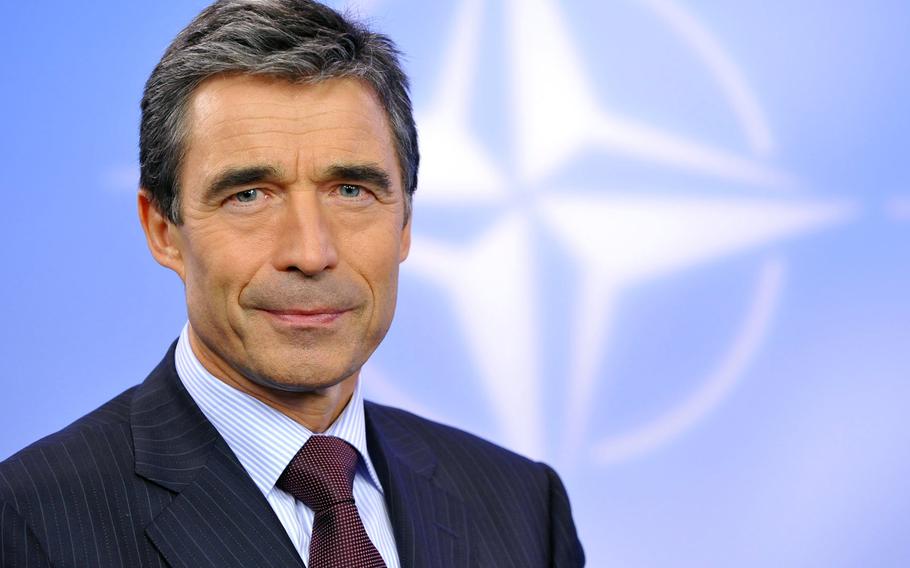
NATO Secretary-General Anders Fogh Rasmussen (NATO)
STUTTGART, Germany — Despite a U.S. decision to scale back its missile shield plans for Europe to divert more resources aimed at a growing threat from North Korea, the U.S. commitment to NATO’s missile defense program remains “ironclad,” the alliance’s top official said Monday.
Last week, Defense Secretary Chuck Hagel announced that the U.S. would scrap the final phase of the European Phased Adaptive Approach for missile defense, which called for the placement of long-range interceptors in Poland.
However, with the U.S. still committed to the first three phases of the plan, all NATO countries will be covered by the shield, which is expected to be in place by 2018, NATO Secretary-General Anders Fogh Rasmussen said during a news conference at his headquarters in Brussels.
“The Europeans will see no difference in their missile defense, and there will be exactly the same coverage of NATO Europe as in the original plan,” he said.
On Monday, China warned the United States that its plans to beef up missile defenses could cause more problems.
“Bolstering missile defenses will only intensify antagonism, and it doesn’t help to solve the issue,” Chinese Ministry of Foreign Affairs spokesman Hong Lei said Monday in Beijing, according to a CNN report.
On Friday, Hagel announced a nearly $1 billion plan to install 14 additional ground-based interceptors at Fort Greely, Alaska, raising the number of West Coast-based interceptors to 44.
When the Obama administration announced plans for the European Phased Adaptive Approach to missile defense in 2009, the plan focused on four phases of development. The first involved the deployment of the sea-based Aegis weapon system in the Mediterranean. Phase two called for the deployment of about 200 sailors to man a similar land-based system in Romania by 2015.
Phases three and four called for the development of weapons systems capable of countering intercontinental ballistic missiles aimed at North America. Russia has viewed those later phases as a threat to its own missile systems.
While phase four has been eliminated, NATO’s plan still calls for missile defense sites to be positioned in both Poland and Romania, Fogh Rasmussen said.
U.S. and NATO officials have insisted the program is directed at threats from the Middle East, such as Iran.
“The U.S. decision has nothing to do with Russia,” Fogh Rasmussen said.
Despite the U.S. decision to scale back its plans in Europe, the move has apparently done little to appease Russian officials, who continue to express concerns that the system is aimed at countering their own ballistic missiles, according to media reports. Russian diplomats have pointed out that the whole idea of an anti-missile defense system didn’t make sense since Iran doesn’t have rockets capable of threatening western Europe.
Fogh Rasmussen, meanwhile, said NATO remains open to some collaboration with Russia on missile defense.
“Let me stress that the NATO missile defense system is not directed against Russia, and both NATO countries and Russia would benefit from such a cooperation. So I hope Russia will take our invitation seriously.”
He said the Russian government had invited him to Moscow and that the two sides were now trying to work out possible dates.
“So hopefully at a time that is convenient for all parties, we will have an opportunity to continue our political dialogue.”
Also during Monday’s news conference, Rasmussen rejected as “ridiculous” recent comments by Afghan President Hamid Karzai, who created a diplomatic stir when he suggested that the U.S. and NATO were colluding with the Taliban as part of an effort to maintain their troop presence in Afghanistan. U.S. officials also have dismissed such comments by Karzai.
“Obviously I’m concerned because the fact is that a lot of effort has been invested in helping Afghanistan to peace, prosperity and ensure security for the Afghan people,” Rasmussen said. “There is still a lot of work to do, but we have achieved a lot of progress and that should be acknolwedged by the Afghan authorities.”
Rasmussen noted that Karzai has stepped back from his comments earlier this month.